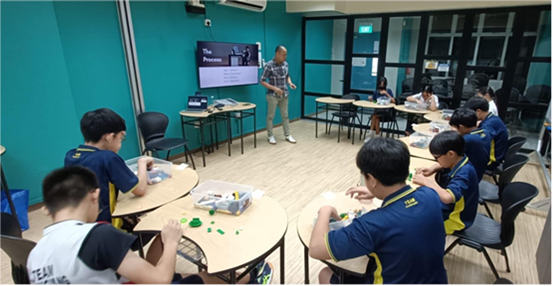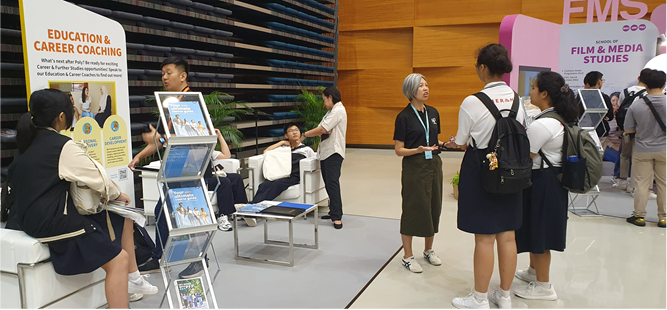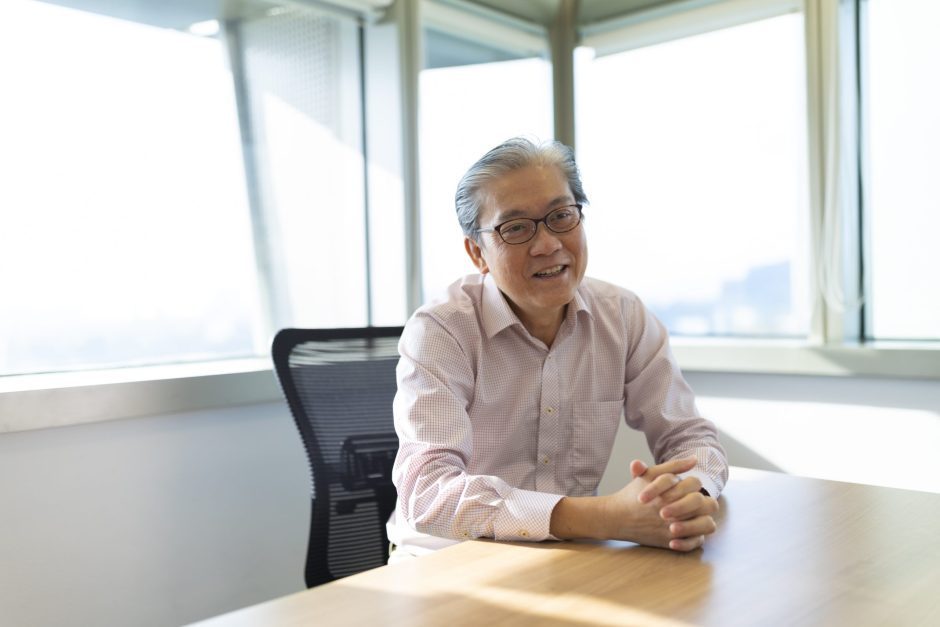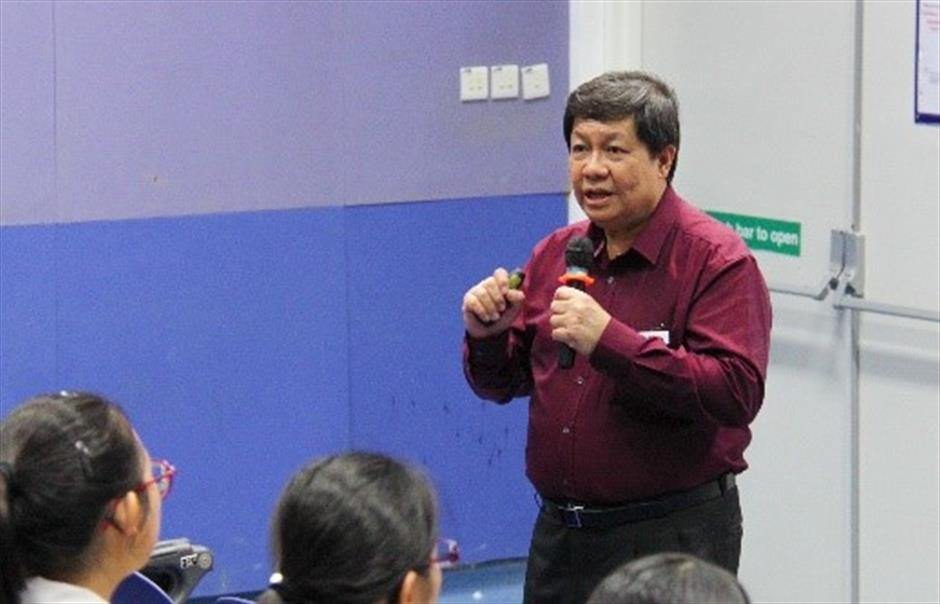Dr Jeffrey Chan received his earliest piece of career advice at a young age.
His father had told him this: Girls should be teachers and boys should join the army. Dr Chan did join the Republic of Singapore Air Force for his first job, but as he says, with a hearty laugh, “That was old-school ECG advice!”
Those were sound career choices back then, he adds, careers that people would take up and stick to for life, but much has since changed in the field of Education and Career Guidance (ECG).
After navigating through several career transitions, Dr Chan found meaning and purpose in his current role as a Master Specialist at MOE’s ECG Branch.
Today, girls should join the army if they so aspire, and boys may be teachers if they wish, he says.
Essentially, ECG introduces students to the wide range of education pathways and careers available to them. Along the way, students are encouraged to discover their interests, nurture their passions and choose career pathways that are meaningful to them and contribute to the community.
To be effective, ECG Branch’s efforts start from primary school all the way to pre-university (at junior colleges, Millenia Institute and schools offering the Integrated Programme), polytechnics and ITEs.
Some may think it is too early to introduce primary school children to the concept of work and careers. But to Dr Chan, “it’s always not early enough”.
When children engage in make-believe fantasy play or creative writing, “they are already imagining a future world”, he points out. That is a good time – even a critical one – to broaden their horizons and introduce the myriad of future opportunities available to them.
‘A lifetime of careers’
Today, every pre-university has a full-time ECG Counsellor (ECGC), while every polytechnic and ITE has a team of Education and Career Coaches (ECCs) in its own career services centre. At the secondary school level, one ECGC is assigned to every two schools.
In 2022, MOE set up the dedicated ECG Branch and has doubled its number of ECGCs and ECCs to over 200 since 2015.
What lies behind this increasing emphasis on ECG?
ECG has been introduced in schools since the 1980s as part of pastoral care. The world of work and what counted as education and career success were simpler then.
In a rapidly changing world, where jobs are being redesigned faster than you can say “AI” for artificial intelligence, adults need to consider the new skills that are essential to acquire, and to prepare for career changes.
Choosing an education and career pathway is thus no longer a “single-point decision”, he explains. Instead, students are taught life skills to help them navigate “a lifetime of careers” (see story below on “Education and Career Guidance across the school years”).
“We want to normalise uncertainty because there’s no single decision that is so dire that it’ll mess up your life,” he notes. “You don’t necessarily have to make the right choice, but you have to make your choice right.”
How ECG is embedded in school experiences
Here’s how ECG enriches the school experience across the various levels:
At primary school:
The focus is on fostering self-discovery. Here, students develop their self-identity, agency, aspirations, and commitment to learning, which are foundational competencies that will help them be successful in school and life. Through the Form Teacher Guidance Period where ECG lessons are provided, teachers guide their students to plan ahead, whether for secondary school choices or ways to further develop their interests and strengths.
Students are also taught the basics of what work is, its value, and how it is respectable, not just to support oneself but to take care of one’s family and to contribute to society. Schools may organise learning experiences such as field trips or “job-shadowing” experiences at their parents’ workplace, to inculcate in students the value of work and the necessity of having good work ethics.
At secondary school:

Primary school efforts are built upon in secondary school, when students start to pick subject combinations that contribute towards shaping their future education and career pathways.
Open-mindedness and the need to explore widely are heavily emphasised at this stage. As Dr Chan explains, “At secondary school, we always try to make sure that students are not narrowing their choices too early.”
For instance, students interested in Science or in helping others may think only of becoming doctors, because of what they were exposed to growing up.
Through ECG conversations with their teachers or the schools’ ECG counsellors, these students may get to know a wider range of roles in the medical industry, such as radiographers, nurses and physical therapists. Their options expand greatly as a result, whether in terms of the institutions and post-secondary courses they apply to or the trajectories their careers could take later in life.
For this age group, the ECG emphasis is to also incorporate both intra-personal knowledge such as personal interests and strengths, and ‘beyond-self’ considerations, which require students to think more deeply about their purpose in life.
“The shift from a more ego-centric way of looking at ECG to a more beyond-self perspective that is future-oriented defines the next bound of ECG and our conception of career guidance,” says Dr Chan.
At post-secondary level:
At this stage, the focus at pre-university institutions, polytechnics and the Institute of Technical Education (ITE) is more to crystallise the students’ initial preferences and initiate planning for their first entry into work or further education, where students are equipped with job-seeking and work-ready skills.
Some topics covered include writing a resume or personal statement for university application, preparing for interviews for jobs, internships, or school admission and giving more attention to personal branding and digital footprints on social media.
Teaching students how to set up a LinkedIn profile for instance, helps post-secondary students appreciate the value of professional networks, the research needed to understand various industries and the skills required for the future.

Drawing from real-world work experience
ECGCs are recruited from various industries and possess at least five years of working experience. Their time spent in the industry gives them first-hand knowledge to guide students through the process of self-discovery and scenarios in the working world – such as how to relate to co-workers, work in teams, or manage career transitions.
To stay abreast of sector and job developments, Dr Chan and his colleagues attend industry networking sessions monthly, where current industry experts speak about their fields, emerging trends, and the skillsets they are looking for during recruitment.
Dr Chan himself went through the process of self-reflection at different junctures of his life, leading him to pursue various fulfilling careers.
After his first job in the air force, he did some introspection where he discovered a deep interest in the human mind and body. This led him to pursue a study of sports science to understand biomechanics, sports psychology, and exercise rehabilitation. This marked the commencement of his second career, during which he assumed various job roles in the field of sports therapy. In what was a natural transition, he went on to be trained as a teacher at the National Institute of Education, where he taught Physical Education and Mathematics.
His interest in improving the physical well-being of a person grew into an interest in nurturing lives. “It’s all about helping people,” says Dr Chan, who made two final switches, to specialise in counselling and then career guidance in 2008. This commitment to a common purpose reflects a consistent life theme, where the underlying motivation in various roles is centred on helping people.
His personal career trajectory reflects a key ECG takeaway: “Career pathways are no longer linear. They’re dynamic.”
Good career planning brings hope
What kind of ECG advice has Dr Chan given his own children?
Leaning back in his chair, Dr Chan shares about the time his son was about to apply to a junior college after his O-Level examinations.
As his son has a deep love for planes, Dr Chan supported his decision to enrol into Singapore Polytechnic’s Diploma in Aeronautical Engineering. It has worked out well; his son, now in his 30s, has been living his dream and taking to the skies as a commercial pilot for the past few years.
So what do Dr Chan and his ECG colleagues hope to achieve through their efforts? Ideally, he says, students will:
- discover the intrinsic value and purpose of work.
- comprehend a broader idea of success and define it on their own terms, regardless of their different starting points in life.
- respect the value of all occupations and debunk stereotypes of work.
- have the resilience to navigate future disruptions and challenges in both life and work.
- embrace lifelong learning to stay relevant.
Ultimately, ECG should bring hope, he says. In students, “there should be a sense of hopefulness that their dreams and aspirations can be met.”






